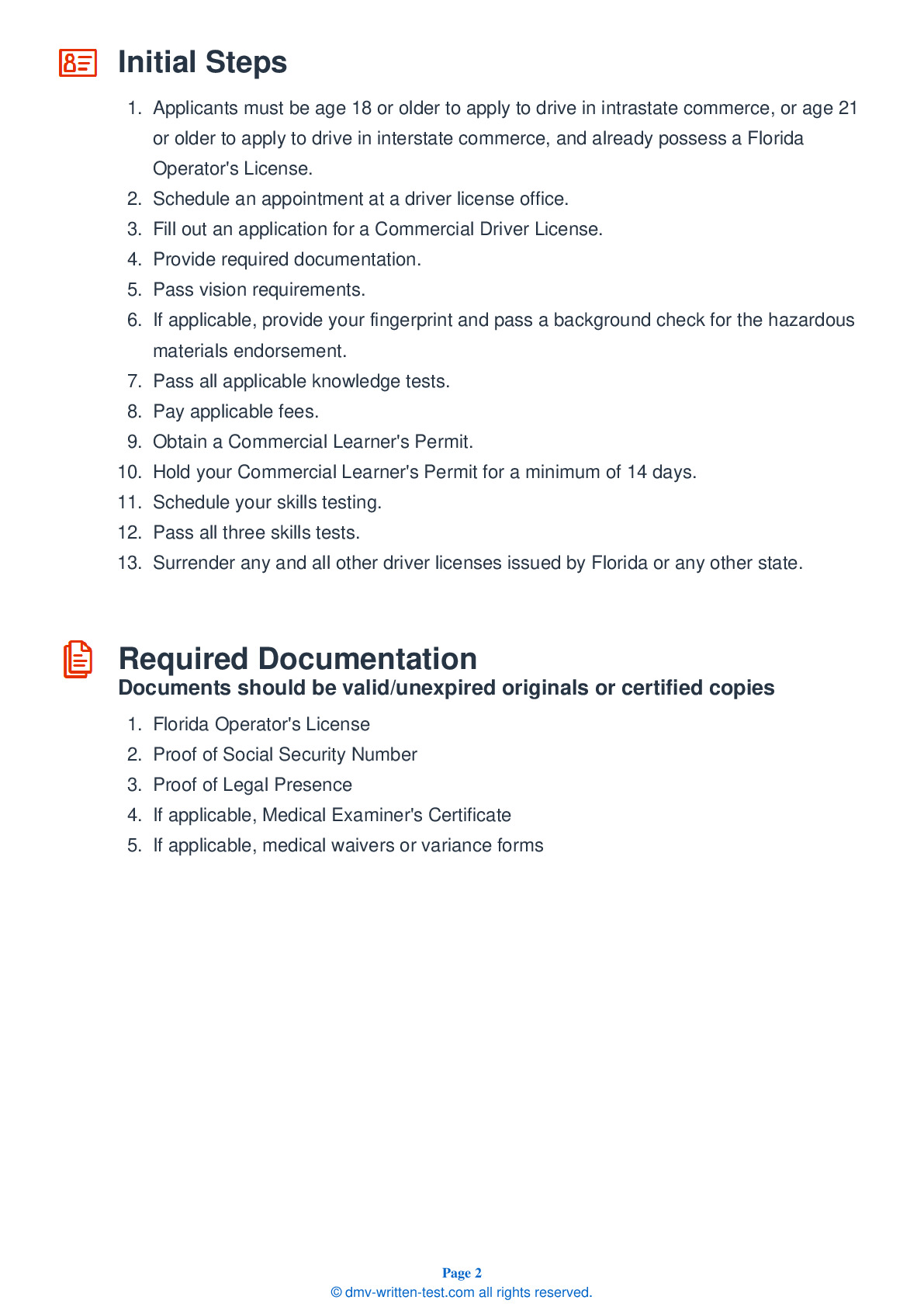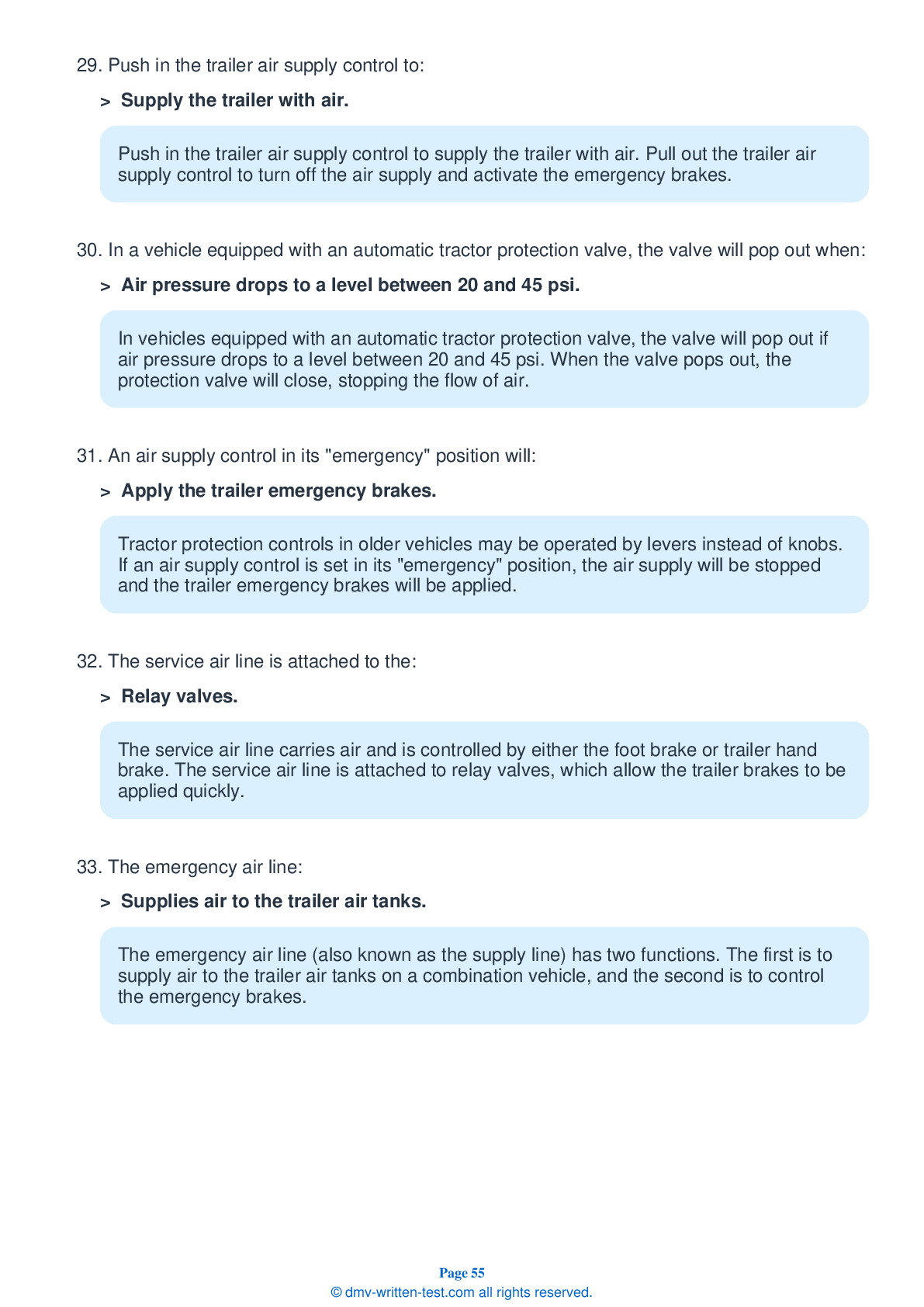Knowledge Test Class B
This license is required for driving a single vehicle with a GVWR of more than 26,001 pounds, and a trailer not to exceed 10,000 pounds gross vehicle weight rating, or a vehicle designed to transport 24 or more people (including the driver). To receive this license, applicants must pass a 50-question test. To pass, applicants must answer 40 questions correctly. Test questions come from the Florida CDL Handbook. Questions come from chapters covering: Introduction, Driving Safely, Transporting Cargo Safely, Air Brakes (if applicable), Combination Vehicles, Pre-Trip Vehicle Inspection Test, Basic Vehicle Control Skills Test and On-Road Driving. Endorsements that may be used with a Class B CDL are: Hazardous materials, Tank, Passenger, HazMat and Tank, Air Brakes and School bus.
8. ____ is a thin layer of ice that forms on road surfaces.
Black ice is a thin layer of ice that is clear enough for the road surface to be seen through it. A road covered in black ice may look like it is merely wet. You should be very careful when temperatures are below freezing and the road looks wet.
9. During a static leakage test, the maximum leakage rate for a single vehicle with air brakes is ____ in one minute.
When performing a static leakage test on a single vehicle with air brakes, the leakage rate should be no more than 2 psi in a minute. If air leaks from the air brake system at a quicker rate, the vehicle should not be driven because something likely needs to be repaired.
10. Before beginning downhill, you should:
On a steep downgrade, you must use the engine's braking effect as your primary method of speed control. Be sure to decelerate and downshift appropriately before beginning to drive down the hill. Relying too heavily on the brakes may cause them to overheat and fade, becoming less effective.
11. Hanging meat as a cargo:
Hanging meat can be an unstable load in a vehicle. The truck may become top-heavy and steering may be inhibited by the swinging meat. Drivers carrying such loads should use particular caution when traveling around sharp curves, such as highway entrance and exit ramps.
12. When double clutching, if you remain in neutral for too long and can’t get your vehicle into the next gear, you should:
If you stay in neutral for too long while double clutching and have difficulty switching your vehicle into the next gear, don't force it. Return to neutral, release the clutch, increase the engine speed to match road speed, and try again.
13. When transporting cargo, you should:
Cargo and its securing devices must be inspected before starting a trip. After beginning a trip, the driver should check the load and securing devices within the first 50 miles on the road, every three hours or 150 miles traveled, and after every break.
14. If a vehicle is found to be over-length during a pre-trip inspection, the driver should:
If a pre-trip inspection reveals a load to be oversize, the driver must confirm that all required signs, flags, lamps, and reflectors are safely and properly mounted, and that and all required permits are in their possession.
Frequently Asked Questions
Here are the steps to obtain a Class B CDL in Florida:
1. Obtain a Florida Commercial Learner's Permit (CLP) by passing the written test for the Class B CDL. You must be at least 18 years old to obtain a CLP and 21 years old to obtain a full Class B CDL.
2. Practice driving with your CLP for at least 14 days before taking the driving skills test.
3. Schedule and pass the driving skills test, which includes pre-trip inspection, basic vehicle control, and on-road driving.
4. Submit the necessary documentation and fees to the Department of Highway Safety and Motor Vehicles (DHSMV) to obtain your Class B CDL.
5. Maintain your Class B CDL by complying with all state and federal regulations, including regular medical examinations and recordkeeping requirements.
It is important to note that obtaining a Class B CDL may also require additional endorsements, such as hazardous materials or passenger transportation endorsements, depending on the type of vehicle you will be operating.
- Straight trucks (e.g., dump trucks, delivery trucks, box trucks)
- Large buses (e.g., school buses, city buses)
- Segmented buses
- Tourist and charter buses
- Tractor-trailer combinations (also known as semi-trucks or 18-wheelers) with a trailer less than 10,000 pounds
It is important to note that additional endorsements may be required to operate certain types of vehicles or cargo. For example, a hazardous materials endorsement is required to transport hazardous materials, and a passenger endorsement is required to transport passengers.
1. Be at least 18 years old to obtain a Commercial Learner's Permit (CLP) and 21 years old for a full Class B CDL.
2. Hold a valid Florida driver's license.
3. Provide proof of identity and residency, such as a birth certificate, passport, or utility bill.
4. Pass a medical examination and obtain a Medical Examiner's Certificate to prove you are physically able to operate a commercial vehicle.
5. Pass a written test for the Class B CDL knowledge test.
6. Obtain a CLP by passing the written test.
7. Hold your CLP for at least 14 days before taking the driving skills test.
8. Pass the driving skills test, which includes pre-trip inspection, basic vehicle control, and on-road driving.
9. Pay the necessary fees to obtain your Class B CDL.
In addition to these requirements, you may need to obtain additional endorsements for certain types of vehicles or cargo, such as hazardous materials or passenger transportation endorsements.
It is important to note that commercial drivers are subject to additional regulations and requirements, including recordkeeping and periodic medical examinations, to ensure safety on the roads.
Drivers who are between the ages of 18 and 20 may only operate commercial vehicles within the state of Florida, and cannot transport hazardous materials or passengers. They are also not eligible for an interstate commerce waiver.
It is important to note that even if you meet the minimum age requirement, you must also meet other requirements, such as passing a medical examination and obtaining a Medical Examiner's Certificate, passing written and driving skills tests, and obtaining any necessary endorsements.
The following endorsements are available for Class B CDL holders in Florida:
1. Passenger endorsement - required for drivers who will be transporting more than 15 passengers, such as in a bus.
2. School bus endorsement - required for drivers who will be operating a school bus.
3. Tanker endorsement - required for drivers who will be hauling liquids or gases in bulk containers.
4. Hazardous materials (HazMat) endorsement - required for drivers who will be transporting hazardous materials, as defined by the federal government.
To obtain any of these endorsements, you must pass additional knowledge tests and meet other requirements, such as background checks and fingerprinting. It is important to note that certain endorsements may also require additional training and certification.
It is recommended to check with your employer or the specific job requirements to determine if any endorsements are needed for your Class B CDL license.
1. Pre-trip inspection: You will be asked to do a pre-trip inspection of your vehicle to ensure that it is safe to operate. This includes checking the brakes, tires, lights, horn, and other important parts of the vehicle.
2. Basic vehicle control: You will be required to demonstrate your ability to control the vehicle in various situations, such as backing up, turning, and parking.
3. Road test: You will be required to drive the vehicle on public roads while demonstrating your ability to safely operate the vehicle and follow traffic laws.
During the skills test, you will be evaluated on your ability to perform each task safely and correctly. The examiner will use a scoring system to evaluate your performance and determine if you have passed or failed the test.
It is important to note that you must hold a valid Commercial Learner's Permit (CLP) for at least 14 days before you can take the skills test. You must also provide a properly equipped and registered vehicle for the test.
1. No passengers: If you have a Class B CDL without a passenger endorsement, you cannot transport more than one passenger who is riding with you to help in the operation of the commercial vehicle.
2. No HazMat: If you have a Class B CDL without a HazMat endorsement, you cannot transport hazardous materials.
3. No combination vehicles: A Class B CDL holder is not allowed to operate a combination of vehicles with a total weight of 26,001 pounds or more.
4. No air brakes: If you take your skills test in a vehicle without air brakes, your CDL will be restricted to vehicles without air brakes.
5. No manual transmission: If you take your skills test in an automatic transmission vehicle, your CDL will be restricted to automatic transmission vehicles only.
It is important to note that these restrictions and limitations may vary depending on the specific endorsements and restrictions on your CDL license. It is recommended to check with the Florida Department of Highway Safety and Motor Vehicles (DHSMV) or your employer for more information on any applicable restrictions or limitations.
To take the written test in a language other than English, you must first obtain a Florida CDL handbook in that language. You can download the handbook from the DHSMV website or obtain a hard copy from a local DHSMV office.
Once you have studied the handbook, you can schedule an appointment to take the written test at a DHSMV office that offers testing in your preferred language. You will need to bring proper identification and payment for any testing fees.
It is important to note that the skills test must be taken in English, as it involves communication with the examiner and following traffic signs and signals in English.
To request accommodations, you must complete an ADA Accommodation Request form and submit it to the DHSMV. You can obtain the form from a local DHSMV office or download it from the DHSMV website.
The form requires documentation of your disability and the specific accommodations you are requesting. Examples of accommodations that may be provided include extended testing time, a separate testing room, or a sign language interpreter.
Once your request has been received and reviewed by the DHSMV, they will contact you to schedule your test with the requested accommodations. It is important to submit your request well in advance of your desired testing date to allow for processing time.
If you have any questions or concerns about requesting accommodations for the Class B CDL written test, you can contact the DHSMV directly for assistance.
When you retake the test, you will need to pay the testing fee again. The fee for the Class B CDL written test is $10.
It is important to note that there is a limit to the number of times you can take the written test in a 30-day period. If you fail the test three times within a 30-day period, you will be required to wait at least 30 days before taking the test again.
To increase your chances of passing the test on your next attempt, it is recommended that you review the Florida CDL Handbook thoroughly and take practice tests before retaking the exam. You can find practice tests online or through commercial CDL training programs.
If you have any questions or concerns about retaking the Class B CDL written test, you can contact the Florida Department of Highway Safety and Motor Vehicles (DHSMV) for assistance.




